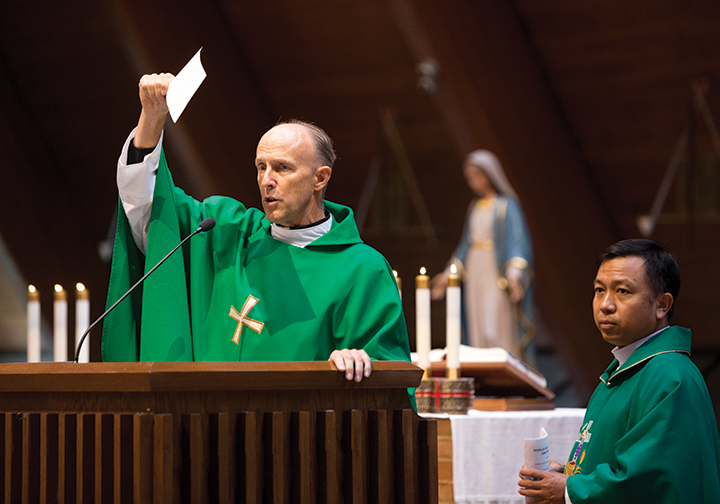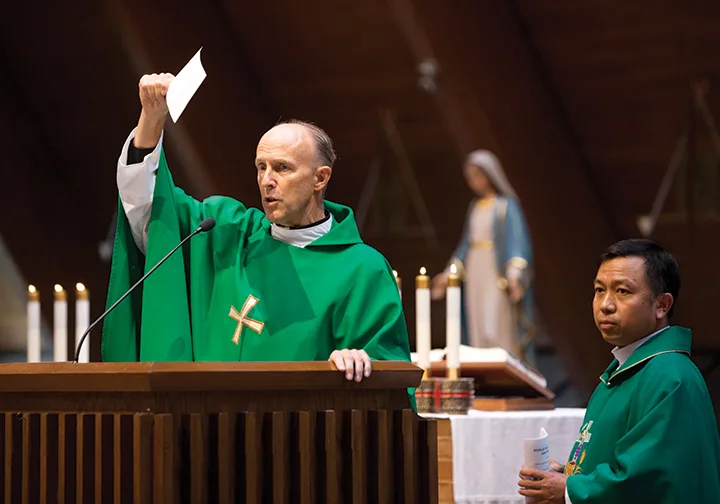 Father Mark Mertes, pastor of St. Patrick Parish in Kansas City, Kansas, preaches at a Mass on the World Day of Migrants and Refugees in 2022. “You can’t read the Bible without being reminded over and over and over again about caring for the migrant, the refugee, the widow, the orphan,” he said. LEAVEN FILE PHOTO BY JAY SOLDNER
Father Mark Mertes, pastor of St. Patrick Parish in Kansas City, Kansas, preaches at a Mass on the World Day of Migrants and Refugees in 2022. “You can’t read the Bible without being reminded over and over and over again about caring for the migrant, the refugee, the widow, the orphan,” he said. LEAVEN FILE PHOTO BY JAY SOLDNER
by Olivia Martin-Davies
olivia.martin@theleaven.org
KANSAS CITY, Kan. — On Aug. 14, Archbishop Shawn McKnight from the Archdiocese of Kansas City in Kansas, Bishop Carl Kemme of the Wichita Diocese and Bishop Gerald Vincke of the Salina Diocese issued a joint pastoral letter emphasizing the human dignity of immigrants and migrants.
A reminder that dignity — not politics — belongs at the heart of any conversation about immigration, the letter calls to mind the church’s age-old position on caring for the vulnerable.
“You can’t read the Bible without being reminded over and over and over again about caring for the migrant, the refugee, the widow, the orphan,” said Father Mark Mertes, pastor of St. Patrick Parish in Kansas City, Kansas. “This is something we never set aside.”
Dignity at the center
“I was very pleased to read the pastoral statement on immigrants,” said Father Michael Hermes, pastor of St. Paul Parish in Olathe. “The Catholic Church is about the only place still left to remind us of the dignity of human life from conception to natural death, and to treat everyone as a child of God, made in God’s image and likeness.”
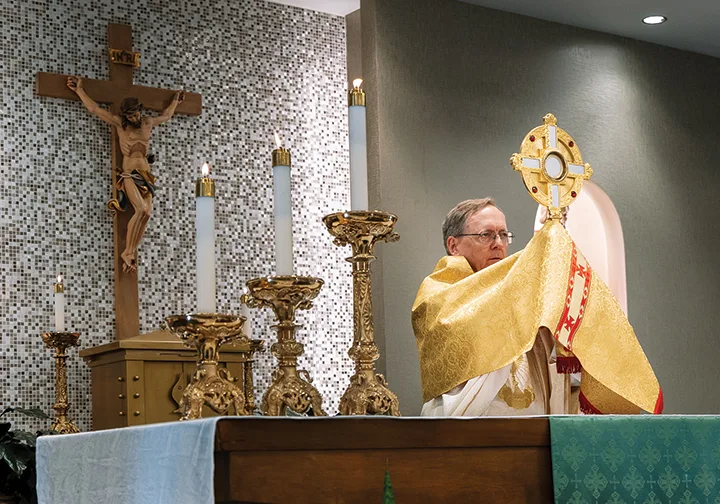 Father Michael Hermes, pastor of St. Paul Parish in Olathe, welcomed the Kansas bishops’ statement on immigration. “The Catholic Church is about the only place still left to remind us of the dignity of human life from conception to natural death, and to treat everyone as a child of God, made in God’s image and likeness,” he said. LEAVEN FILE PHOTO BY JAY SOLDNER
Father Michael Hermes, pastor of St. Paul Parish in Olathe, welcomed the Kansas bishops’ statement on immigration. “The Catholic Church is about the only place still left to remind us of the dignity of human life from conception to natural death, and to treat everyone as a child of God, made in God’s image and likeness,” he said. LEAVEN FILE PHOTO BY JAY SOLDNER
That dignity is reflected in the everyday lives of Catholic immigrants — something Father Hermes was glad to see front and center in the pastoral letter.
“Working migrants, those volunteering in our parishes, paying taxes, sacrificing for their families and following our laws, deserve not fear and intimidation but protection, solidarity and a welcoming community,” quoted Father Hermes.
“That describes [our] Catholic immigrant parishioners at St. Paul Parish,” he added.
‘Real people, real families, with real consequences’
Father Peter Jaramillo, SSA, pastor of St. Mary-St. Anthony Parish in Kansas City, Kansas, emphasized that this letter couldn’t have come at a better time.
“There’s a sense of fear and concern, and people are not out and about as they were a couple years ago,” said Father Peter, “and that [fear] is like a cloud hanging over them.”
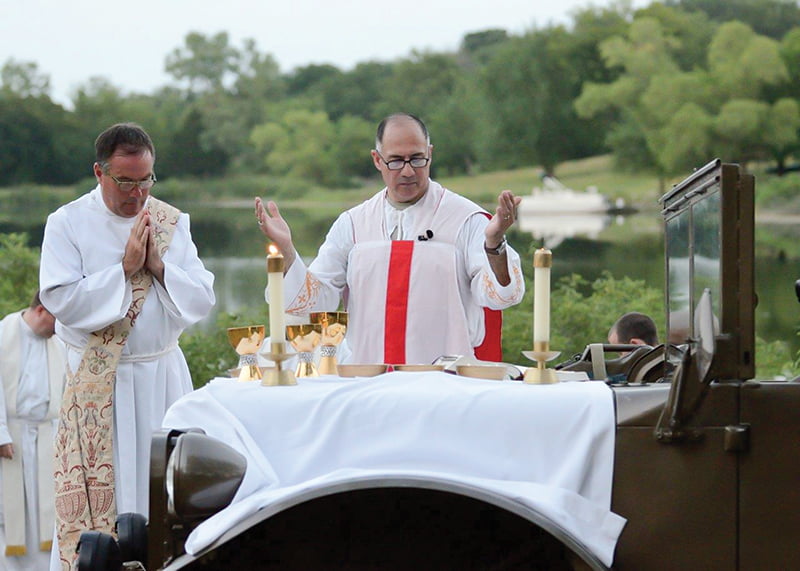 Deacon Dana Nearmyer (left) assists former Army chaplain and Iraq War veteran Father Peter Jaramillo, SSA, celebrating Mass on the hood of a truck from the Korean War. LEAVEN FILE PHOTO BY JILL RAGAR ESFELD
Deacon Dana Nearmyer (left) assists former Army chaplain and Iraq War veteran Father Peter Jaramillo, SSA, celebrating Mass on the hood of a truck from the Korean War. LEAVEN FILE PHOTO BY JILL RAGAR ESFELD
Local raids in places like Liberty, Missouri, Olathe and more recently in Kansas City, Kansas, have especially shaken families.
As a result, some churches have seen a decline in Mass attendance this summer.
Several priests shared that fear of the unknown extends not only to under- documented people, but also to their families, friends and people who have sound legal status.
“I’ve had so many people come to me,” said Father Anthony Saiki, rector of the Cathedral of St. Peter the Apostle in Kansas City, Kansas, “who are here with documentation — with current visas — who are afraid they’re going to be deported and rounded up along with anybody else, like a kind of collateral damage.”
Father Saiki added that even some of his parishioners who are U.S. citizens — afraid they will be detained because of their accent or the color of their skin — now carry passports to work.
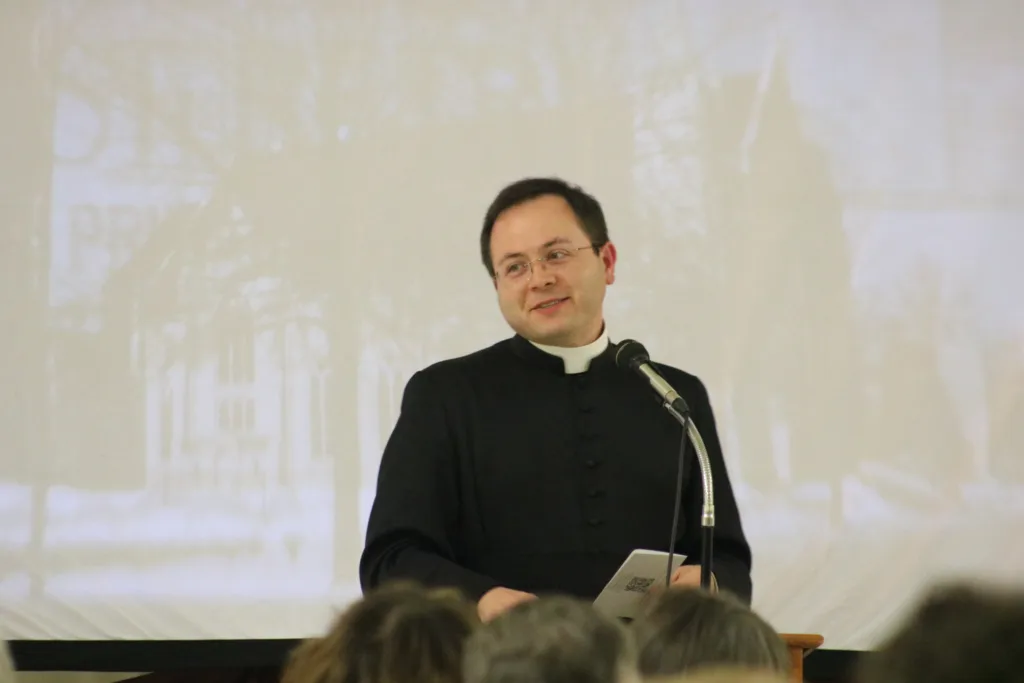 Father Anthony Saiki, the current rector of the Cathedral of St. Peter in Kansas City, Kansas, speaks during the inaugural Cathedral Gala on Feb. 10, 2024. LEAVEN FILE PHOTO BY MARC ANDERSON
Father Anthony Saiki, the current rector of the Cathedral of St. Peter in Kansas City, Kansas, speaks during the inaugural Cathedral Gala on Feb. 10, 2024. LEAVEN FILE PHOTO BY MARC ANDERSON
“The fear . . . is very real,” said Father Matt Nagle, pastor of Mater Dei Parish in Topeka. “And that’s a tragedy that people have to live in that fear.”
Father Peter, an army veteran who served for over 20 years, stressed that upholding the law is essential to creating a good, stable nation — but it shouldn’t have to come at the cost of upholding human dignity.
“It’s important that law enforcement treat people with respect,” he said. “I praise the law enforcement [officers] that are doing a great job with their work. But I’m concerned that we make sure that political leaders, as well as spiritual leaders, have a sense of respect for human dignity at all times.”
Father Nagle echoed that sentiment, pointing out that the people at the heart of conversations and policies about immigration aren’t statistics but are “real people, real families, with real consequences for our communities.”
A call to compassion
Parish leaders say the bishops’ letter not only offers comfort but also strengthens their own voices.
“My people believe that it’s important for bishops, priests and pastors to speak out,” said Father Peter. “They feel comforted when they have the voice of the archbishop speaking on their behalf.”
An archdiocesan priest added that after he read the pastoral letter at his weekend Masses, one of his parishioners — who had been detained, released and is now pending a trial — expressed her appreciation for the archbishop’s attention to the dignity of immigrants and migrants.
For despite fear and uncertainty, the Catholic Church’s role is clear.
A parishioner of an archdiocesan parish, a notary who often helps immigrant families with their paperwork, put it simply.
“A lot of people are scared because they think [ICE] will come into the churches like in Los Angeles and Chicago,” the parishioner said. “I understand the church can’t do anything against [ICE].”
But the pastoral letter’s message is important just the same.
“It tells us we are not alone,” the parishioner concluded.
